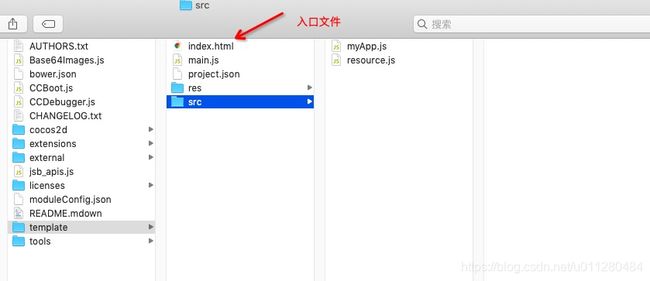cocos2d-x-html5之游戏启动
接触cocos2dx有5年多来,以后可能要切换到creator了。所以打算重新学习一下cocos2dx源码,并记录一下。
今天我们来讲一下web版本是怎么启动,首先看下模版工程的文件结构,其中index.html为入口。

接下来我们看下index.html里面的源码
<!DOCTYPE html>
<html>
<head>
<meta charset="utf-8">
<title>Cocos2d-html5 Hello World test</title>
<link rel="icon" type="image/GIF" href="res/favicon.ico" />
<meta name="viewport" content="width=321,user-scalable=no" />
<meta name="apple-mobile-web-app-capable" content="yes" />
<meta name="full-screen" content="yes" />
<meta name="screen-orientation" content="portrait" />
<meta name="x5-fullscreen" content="true" />
<meta name="360-fullscreen" content="true" />
<style>
body,
canvas,
div {
-moz-user-select: none;
-webkit-user-select: none;
-ms-user-select: none;
-khtml-user-select: none;
-webkit-tap-highlight-color: rgba(0, 0, 0, 0);
}
</style>
<!--加载脚本-->
<script src="../CCBoot.js"></script>
<!--程序入口-->
<script src="main.js"></script>
</head>
<body style="padding:0; margin: 0; background: #000;">
<script src="res/loading.js"></script>
<canvas id="gameCanvas" width="321" height="480"></canvas>
</body>
</html>
可以看到这边是加载了CCBoot.js和main.js文件,其中CCBoot.js是引擎提供的,里面包含了游戏启动的流程,main.js是每个项目组自己写的。
接下来我们看下main.js的源码:
// 重写 onStart 函数,执行cc.game.run后,最终执行这里
cc.game.onStart = function () {
// 如果index.html引用了loading.js,这里需要移除
if (!cc.sys.isNative && document.getElementById("cocosLoading")) //If referenced loading.js, please remove it
document.body.removeChild(document.getElementById("cocosLoading"));
// 声明并定义设计分辨率(竖屏)
var designSize = cc.size(480, 800);
// 屏幕分辨率
var screenSize = cc.view.getFrameSize();
// 如果不是原生,且高度小于800
if (!cc.sys.isNative && screenSize.height < 800) {
// 修改设计分辨率
designSize = cc.size(320, 480);
cc.loader.resPath = "res/Normal";
} else {
cc.loader.resPath = "res/HD";
}
// 等比拉伸,会留黑边
cc.view.setDesignResolutionSize(designSize.width, designSize.height, cc.ResolutionPolicy.SHOW_ALL);
//load resources
// 运行loaderScene场景,加载资源成功后,运行回调函数
cc.LoaderScene.preload(g_resources, function () {
// 运行自己的场景,在src/myApp.js
cc.director.runScene(new MyScene());
}, this);
};
// 启动游戏,该方法在 CCBoot.js里面实现
cc.game.run();
流程可以看注释,从代码中我们看到加载资源的时候,是运行了cc.LoaderScne.preload来创建一个过渡场景,等资源加载成功后,运行自己的场景 MyScene。
接下来我们看下 CCLoaderScene.js的源码
/**
* cc.LoaderScene is a scene that you can load it when you loading files
* cc.LoaderScene can present thedownload progress
* @class
* @extends cc.Scene
* @example
* var lc = new cc.LoaderScene();
*/
// 用于下载文件时显示的场景
cc.LoaderScene = cc.Scene.extend({
_interval: null,
_label: null,
_logo: null,
_className: "LoaderScene",
cb: null,
target: null,
/**
* Contructor of cc.LoaderScene
* @returns {boolean}
*/
init: function () {
// this赋值给self,后面不用 .bind(this)来访问成员方法
var self = this;
//logo
var logoWidth = 160;
var logoHeight = 200;
// bg 创建颜色层
var bgLayer = self._bgLayer = new cc.LayerColor(cc.color(32, 32, 32, 255));
// 添加到场景
self.addChild(bgLayer, 0);
//image move to CCSceneFile.js
var fontSize = 24,
lblHeight = -logoHeight / 2 + 100; // 默认正中间
cc._loaderImage = null;
if (cc._loaderImage) {
//loading logo
// 加载logo
cc.loader.loadImg(cc._loaderImage, {
// 不跨域
isCrossOrigin: false
}, function (err, img) {
logoWidth = img.width;
logoHeight = img.height;
// 显示logo
self._initStage(img, cc.visibleRect.center);
});
fontSize = 14;
// 有logo的时候,logo往下 10像素
lblHeight = -logoHeight / 2 - 10;
}
//loading percent
var label = self._label = new cc.LabelTTF("Loading... 0%", "Arial", fontSize);
// 设置坐标
label.setPosition(cc.pAdd(cc.visibleRect.center, cc.p(0, lblHeight)));
label.setColor(cc.color(180, 180, 180));
bgLayer.addChild(this._label, 10);
return true;
},
_initStage: function (img, centerPos) {
var self = this;
// 创建纹理
var texture2d = self._texture2d = new cc.Texture2D();
texture2d.initWithElement(img);
texture2d.handleLoadedTexture();
var logo = self._logo = new cc.Sprite(texture2d);
// 设置缩放
logo.setScale(cc.contentScaleFactor());
logo.x = centerPos.x;
logo.y = centerPos.y;
self._bgLayer.addChild(logo, 10);
},
/**
* custom onEnter
*/
onEnter: function () {
var self = this;
cc.Node.prototype.onEnter.call(self);
// 0.3秒后执行 _startLoading 这边是循环定时器
self.schedule(self._startLoading, 0.3);
},
/**
* custom onExit
*/
onExit: function () {
cc.Node.prototype.onExit.call(this);
var tmpStr = "Loading... 0%";
this._label.setString(tmpStr);
},
/**
* init with resources
* @param {Array} resources
* @param {Function|String} cb
* @param {Object} target
*/
initWithResources: function (resources, cb, target) {
if (cc.isString(resources))
resources = [resources];
this.resources = resources || [];
this.cb = cb;
this.target = target;
},
_startLoading: function () {
var self = this;
// 取消定时器
self.unschedule(self._startLoading);
var res = self.resources;
// 加载资源
cc.loader.load(res,
// 每个加载后的回调
function (result, count, loadedCount) {
var percent = (loadedCount / count * 100) | 0;
percent = Math.min(percent, 100);
self._label.setString("Loading... " + percent + "%");
},
function () {
if (self.cb)
self.cb.call(self.target);
});
},
_updateTransform: function () {
this._renderCmd.setDirtyFlag(cc.Node._dirtyFlags.transformDirty);
this._bgLayer._renderCmd.setDirtyFlag(cc.Node._dirtyFlags.transformDirty);
this._label._renderCmd.setDirtyFlag(cc.Node._dirtyFlags.transformDirty);
this._logo && this._logo._renderCmd.setDirtyFlag(cc.Node._dirtyFlags.transformDirty);
}
});
/**
* cc.LoaderScene.preload can present a loaderScene with download progress.
* when all the resource are downloaded it will invoke call function
* @param resources 需要加载的资源
* @param cb 资源全部加载后的回调
* @param target cb函数的指向
* @returns {cc.LoaderScene|*}
* @example
* //Example
* cc.LoaderScene.preload(g_resources, function () {
cc.director.runScene(new HelloWorldScene());
}, this);
*/
cc.LoaderScene.preload = function (resources, cb, target) {
var _cc = cc;
if (!_cc.loaderScene) {
// 实例化LoaderScene
_cc.loaderScene = new cc.LoaderScene();
// 初始化,显示logo等信息
_cc.loaderScene.init();
// 注册监听工程文件修改
cc.eventManager.addCustomListener(cc.Director.EVENT_PROJECTION_CHANGED, function () {
_cc.loaderScene._updateTransform();
});
}
// 保存要加载的资源,资源全部加载完成后的回调
_cc.loaderScene.initWithResources(resources, cb, target);
// 运行当前场景
cc.director.runScene(_cc.loaderScene);
return _cc.loaderScene;
};
看下src/myApp.js的源码
// 自己的层
var MyLayer = cc.Layer.extend({
// 文本控件声明
helloLabel: null,
// 精灵控件声明
sprite: null,
init: function () {
//
// 1. super init first
this._super();
/
// 2. add a menu item with "X" image, which is clicked to quit the program
// you may modify it.
// ask director the window size
// 获取窗口大大
var size = cc.director.getWinSize();
// add a "close" icon to exit the progress. it's an autorelease object
// 创建菜单选项
var closeItem = new cc.MenuItemImage(
s_CloseNormal,
s_CloseSelected,
function () {
cc.log("close");
}, this);
// 设置锚点
closeItem.setAnchorPoint(0.5, 0.5);
// 创建菜单
var menu = new cc.Menu(closeItem);
menu.setPosition(0, 0);
// 添加到层
this.addChild(menu, 1);
closeItem.setPosition(size.width - 20, 20);
/
// 3. add your codes below...
// add a label shows "Hello World"
// create and initialize a label
// 创建文本控件
this.helloLabel = new cc.LabelTTF("Hello World", "Impact", 38);
// position the label on the center of the screen
this.helloLabel.setPosition(size.width / 2, size.height - 40);
// add the label as a child to this layer
this.addChild(this.helloLabel, 5);
// add "Helloworld" splash screen"
// 创建精灵
this.sprite = new cc.Sprite(s_HelloWorld);
this.sprite.setAnchorPoint(0.5, 0.5);
this.sprite.setPosition(size.width / 2, size.height / 2);
this.sprite.setScale(size.height / this.sprite.getContentSize().height);
this.addChild(this.sprite, 0);
}
});
// 自己的场景
var MyScene = cc.Scene.extend({
// 运行场景后,下一帧执行该函数
onEnter: function () {
this._super();
// 创建一个层
var layer = new MyLayer();
// 添加到场景上
this.addChild(layer);
// 运行层的init方法
layer.init();
}
});
做个总结:
1、入口为index.html,里面加载了CCBoot.js和main.js
2、main.js重写了CCBoot.js里面的cc.game.onStart方法,并执行cc.game.run(),然后执行onStart方法(原因见后面教程)
3、onStart方法运行了LoaderScene场景并加载游戏资源
4、加载成功后,运行自己的场景myScene